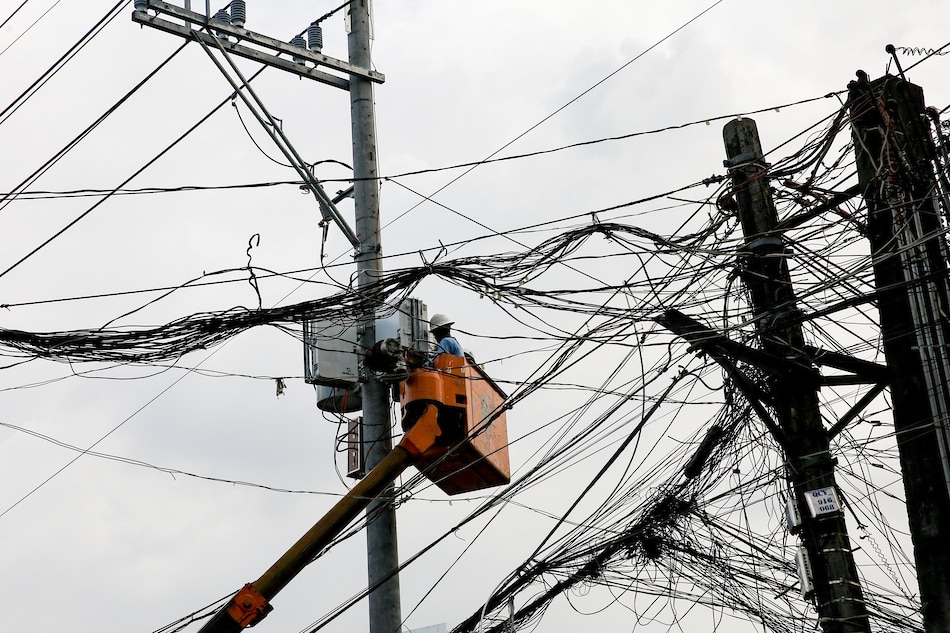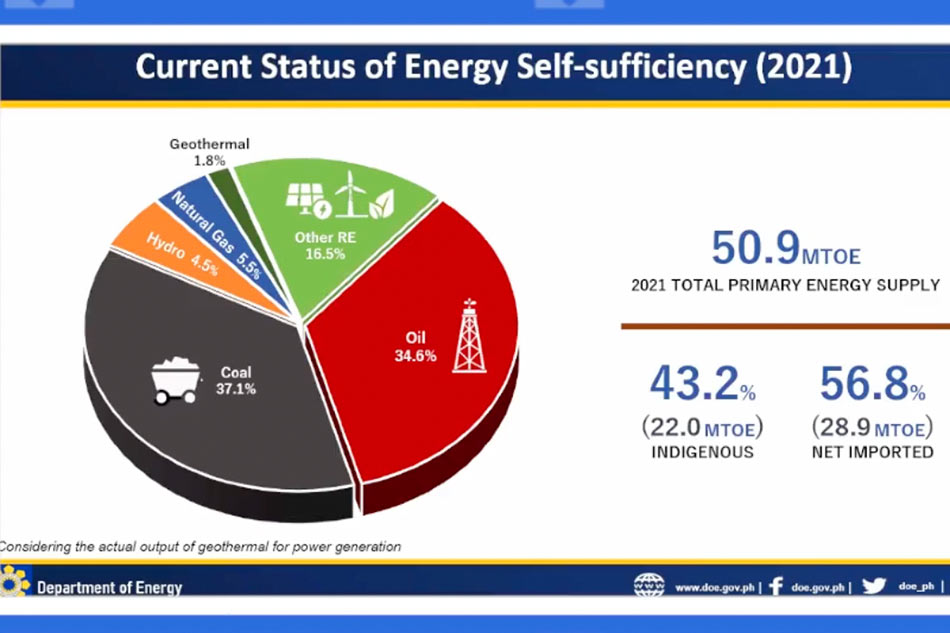DOE: PH to veer away from power resource importation after Marcos directive | ABS-CBN
ADVERTISEMENT

Welcome, Kapamilya! We use cookies to improve your browsing experience. Continuing to use this site means you agree to our use of cookies. Tell me more!
DOE: PH to veer away from power resource importation after Marcos directive
DOE: PH to veer away from power resource importation after Marcos directive
Job Manahan,
ABS-CBN News
Published Aug 09, 2022 07:47 PM PHT
MANILA — The Philippines will try to expand the development of the country's indigenous energy resources to finally deviate from power resource importation, the Department of Energy (DOE) said on Tuesday.
MANILA — The Philippines will try to expand the development of the country's indigenous energy resources to finally deviate from power resource importation, the Department of Energy (DOE) said on Tuesday.
Energy Secretary Raphael Lotilla said it was something that President Ferdinand Marcos, Jr. directed his agency to do during his most recent Cabinet meeting.
Energy Secretary Raphael Lotilla said it was something that President Ferdinand Marcos, Jr. directed his agency to do during his most recent Cabinet meeting.
"The energy goal [is to] accelerate and expand the development of our indigenous energy resources in order to provide accessible and affordable energy to the Filipino people as we transition to a sustainable low-carbon future," the energy chief's presentation read.
"The energy goal [is to] accelerate and expand the development of our indigenous energy resources in order to provide accessible and affordable energy to the Filipino people as we transition to a sustainable low-carbon future," the energy chief's presentation read.
The move will help the country attain energy security, noted Lotilla.
The move will help the country attain energy security, noted Lotilla.
ADVERTISEMENT
"The total supply of energy that we are using is 56.8 percent imported, as against to only 43 percent domestic or indigenous. So you can say that we are very energy insecure," he told reporters in a press briefing.
"The total supply of energy that we are using is 56.8 percent imported, as against to only 43 percent domestic or indigenous. So you can say that we are very energy insecure," he told reporters in a press briefing.
"The power generation mix and power capacity— if you are going to look at the total indigenous power from indigenous sources, it is less than 50 percent, with only 45.1 percent as against imported 54.9 percent," he added.
"The power generation mix and power capacity— if you are going to look at the total indigenous power from indigenous sources, it is less than 50 percent, with only 45.1 percent as against imported 54.9 percent," he added.
Lotilla noted how the country's dependence on imported coal sources is already at 87.2 percent, with Indonesia as main source at 97.7 percent.
Lotilla noted how the country's dependence on imported coal sources is already at 87.2 percent, with Indonesia as main source at 97.7 percent.
Majority or 90 percent of the country's total coal consumption is for power, while the cement and other sectors account for the rest, he said.
Majority or 90 percent of the country's total coal consumption is for power, while the cement and other sectors account for the rest, he said.
The country's renewable energy sources, he said, have been limited in terms of power capacity.
The country's renewable energy sources, he said, have been limited in terms of power capacity.
While the installed and dependable on-grid capacity for renewable energy sources are at 29 percent, he said the power generation capacity is lower at 22 percent.
While the installed and dependable on-grid capacity for renewable energy sources are at 29 percent, he said the power generation capacity is lower at 22 percent.
The long-term solution, he said, is to finally move from "over dependence" on imported sources and go to the country's own power sources.
The long-term solution, he said, is to finally move from "over dependence" on imported sources and go to the country's own power sources.
"That's the reason why one of the major focus of the President is on the upstream natural gas development of our indigenous resources. That is why he wants to make sure that the policy environment for investors in the upstream is going to be first: certain, second: stable, and third: absolutely clear," Lotilla said.
"That's the reason why one of the major focus of the President is on the upstream natural gas development of our indigenous resources. That is why he wants to make sure that the policy environment for investors in the upstream is going to be first: certain, second: stable, and third: absolutely clear," Lotilla said.
"So if we can introduce hybrid system, we have more renewables, in-relation to the oil-based, then the cost can be more affordable and power can be more accessible for our people," he added.
"So if we can introduce hybrid system, we have more renewables, in-relation to the oil-based, then the cost can be more affordable and power can be more accessible for our people," he added.
The DOE, the official said, is already addressing Marcos' directive to ensure that the investment space for the upstream natural gas development and the power sector would be clear and unhindered.
The DOE, the official said, is already addressing Marcos' directive to ensure that the investment space for the upstream natural gas development and the power sector would be clear and unhindered.
Press Secretary Trixie Cruz-Angeles said the government is targeting to form the next steps to lower the country's dependence on power importation.
Press Secretary Trixie Cruz-Angeles said the government is targeting to form the next steps to lower the country's dependence on power importation.
Lotilla, meanwhile, urged the public to practice energy conservation given the country's "constricted" power supply.
Lotilla, meanwhile, urged the public to practice energy conservation given the country's "constricted" power supply.
During his first State of the Nation Address, Marcos said he would prioritize the country's shift to renewable energy to combat climate change.
During his first State of the Nation Address, Marcos said he would prioritize the country's shift to renewable energy to combat climate change.
This includes the inclusion of nuclear power to the country's energy mix and the possible creation of nuclear power plants that adhere to international standards.
This includes the inclusion of nuclear power to the country's energy mix and the possible creation of nuclear power plants that adhere to international standards.
Lotilla, during the same press briefing, told reporters that the country would first need a nuclear regulatory framework before they could even start discussions on the establishment of new nuclear power plants.
Lotilla, during the same press briefing, told reporters that the country would first need a nuclear regulatory framework before they could even start discussions on the establishment of new nuclear power plants.
Read More:
Department of Energy
DOE
Marcos
renewable energy
indigenous energy resources
power woes
DOE energy goal
indigenous power sources
Raphael Lotilla
coal
ADVERTISEMENT
ADVERTISEMENT




